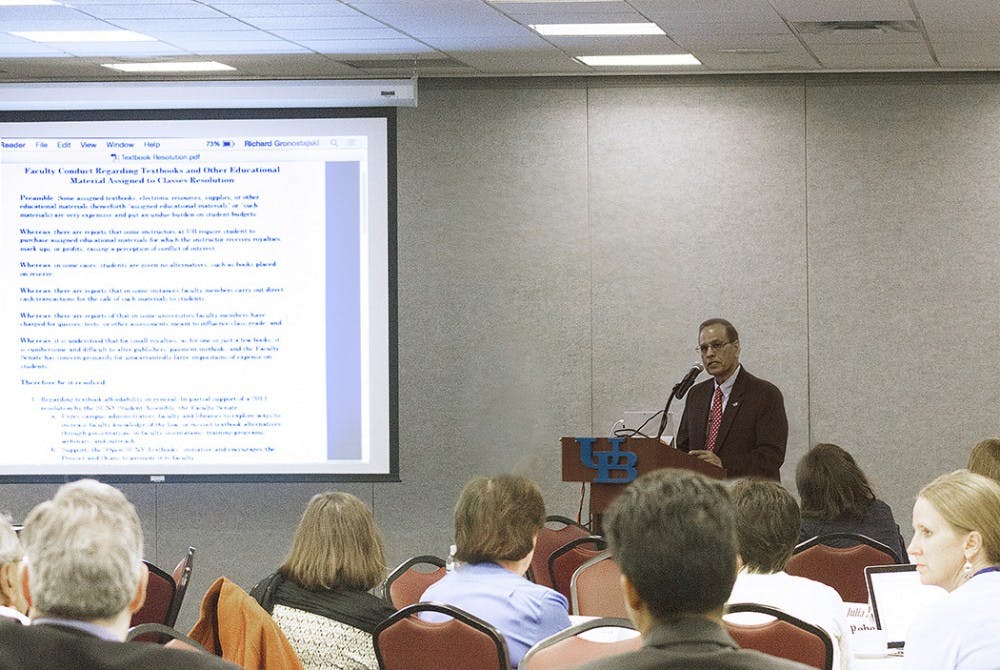The Faculty Senate finally passed regulations on professors selling their own self-published textbooks on Tuesday.
The Senate passed the resolution, which is made up of five sections to regulate professors assigning their own textbooks and stop money exchange in classrooms, in a 33-8 vote. Provost Charles Zukoski and President Satish Tripathi must now approve the resolution.
The Senate was supposed to vote on the new regulations at the final meeting of last semester, but not enough senators showed up to vote to have quorum. Getting more faculty to attend meetings was one of the topics the body discussed Tuesday, which was its first meeting of the semester.
Former Spectrum editor Emma Janicki wrote an article in November 2014 on four UB professors who assign their own textbooks for their courses, with some of them requiring students to pay them in cash for books. The article compelled the Senate’s Executive Committee to draft a policy on textbook assignments.
Philip Glick, current Faculty Senate chair, said the Senate thought it was unethical that faculty were making students buy their textbooks in their classes. He said the resolution would make sure the royalty professors receive from books do not go in the faculty’s pocket, but instead a “non-for-profit” source.
Glick said he spoke to the professors that were selling self-published textbooks. The professors said they were trying to save money for the students because the same textbooks in bookstores would sell for 40 percent more than the original price.
“Perhaps they were well-meaning but it just didn’t pass the smell test,” Glick said. “At the very least we’re [going to] move these cash transactions to departmental offices, but what we’d really like is a third party involved and the Student Association has actually volunteered to be that third party.”
Glick said the Senate will enforce attendance rules during this academic year. Two unexcused absences from the Senate or Executive Committee will result in warning. Members who are continuously absent and fail to report an alternate will face termination from the Senate, according to Glick.
Glick said the “whole theme” of this school year would be upholding this policy.
The Senate also discussed shared governance. Glick said shared governance holds that the professional staff, the faculty, SA, the administration and all Councils should have an equal voice for everything that goes in the university and that no groups are subordinated in any way.
"The professional staff has a feeling that sometimes they’re subordinated at the table so my goal is to raise them up," Glick said.
The Senate will have to vote to change the name of the Office of University Governance to the Office of Shared University Governance.
The Senate is also looking to promote sustainability this semester, according to Glick. The senate plans to redo their website and issue electronic agendas, rather than paper agendas ones at all of their meetings.
Glick said, “It’s not just about recycling bottles and stuff.”
The Senate recently established a Twitter account to push the social media initiative. Glick said social media is a crucial way to influence people, get information out quickly and share opinions.
Tripathi briefly addressed the Senate at the meeting. He addressed graduate fine arts student Ashley Powell’s controversial art project, in which she hung “White Only” and “Black Only” signs around campus.
“Exploring difficult and even painful topics is part of what we do as an academic community, [and such] a discourse should take place in a safe and inclusive campus environment,” Tripathi said.
He said as a campus community, “we are opening up a productive dialogue about the campus communities of academic freedom,” and such a space should be “characterized by mutual respect.”
The next Faculty Senate meeting will be held on Nov. 3 at 3 p.m. at the Center for Tomorrow on North Campus.
Ashley Inkumsah is the news editor and can be reached at ashley.inkumsah@ubspectrum.com





